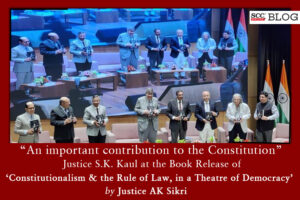Eastern Book Company released Justice A.K. Sikri’s Constitutionalism & the Rule of Law: In a Theatre of Democracy on 9-08-2023. You can order your copies of the book here.
The event witnessed some esteemed guests from the legal fraternity.
About the Book
“It has been a wonderful experience working with Justice Sikri on this book” said Mr. Sumeet Malik (Associate Editor, Supreme Court Cases) as he welcomed the guests and shared a few glimpses on the making of Justice A.K. Sikri’s book titled Constitutionalism & the Rule of Law: In a Theatre of Democracy.
Justice Sanjay Kishan Kaul, Supreme Court Judge shared that Justice Sikri had always been an academician for them and tagged Justice Sikri’s book as an important contribution to the Constitution. He said that “There’s a phenomenon that Constitution contains answers to all aspects of Indian life, but the starting point of such distinction is between Constitution and constitutionalism. This has been well discussed in Justice Sikri’s book.” In some ways, constitutionalism is the subset of constitutional regime.” Before concluding, he looked forward that “I hope this book is the first of many.”
Justice Rohinton Fali Nariman, Former Judge, Supreme Court of India expressed that “This beautiful book has come as a timely reminder to democratic governance worldwide” and suggested that a copy of Justice Sikri’s book must be given to the people of Israel, as he discussed the manner in which matters are dealt with in our country through the Constitution of India
Professor (Dr.) Upendra Baxi, Emeritus Professor of Law agreed with Justice Nariman’s suggestion that the book should be read by the people of Israel, but commented that in that case, the book needs to be translated in another language, and added that we need to think what Israel may bring back for us in return.
R. Venkataramani, Attorney General for India was of the view that Justice Sikri’s book brings some interesting insights in expanding horizon of fundamentals of life around the world and suggested that we must welcome the ideas that come through this book.
Justice Sikri revealed that “apart from essays on Constitutionalism and access to Justice, I have also written about my two teachers as well, one is professor Baxi and other is Professor MP Singh”
Book release
Panel Discussion
Ms Prachi Bharadwaj, Senior Associate Editor at EBC introduced the panelists: Justice Sanjiv Khanna, Senior Advocate Arvind P. Datar, Senior Advocate Madhavi Goradia Divan and Justice A.K. Sikri for discussion on the theme of Justice Sikri’s book “Constitutionalism & the Rule of Law: In a Theatre of Democracy” and the discussion was moderated by Professor (Dr.) C. Raj Kumar.
As Professor (Dr.) C. Raj Kumar being the moderator started with the question of ‘What is the role of a Judge in a Constitutional democracy?’, Justice Sanjiv Khanna quoted various parts of Justice Sikri’s book answering this very question. He went on to accept that pendency of cases is a big problem in India and categorization of criminal matters, traffic chalan, etc. May bring some clarity to check which cases go beyond 4 years. He expressed concern that “It’s not acceptable that a case takes 5-6 years to be disposed of.”
Professor (Dr.) Upendra Baxi commented that the book launch event was good, but a greater occasion was the wisdom being conveyed in Justice Sikri’s book which was a constitutional event. While discussing separation of powers, Professor Baxi explained that “The question of justice and fairness does not rest with the legislature. Everything must be proportionate.” Apart from the Courts and Lok Adalats, we have this concept of ‘Parlok Adalats’ ~Prof. Baxi commented on a lighter note.
“Our Constitution starts with ‘we the people’, going by the social contact theory and how it developed over time. When people elect the government, it doesn’t mean that the rulers enjoy absolute powers. Our Constitution limits their powers.” said Justice A.K. Sikri as he explained that the Constitution limits the powers of all the State organs, be it Legislature, Executive or the Judiciary. He further pointed out that “There is some Constitutionalism that is above the Constitution.”
On the pretext of access to Justice, the moderator, Prof. (Dr.) C. Raj Kumar asked Senior Advocate Arvind Datar: “Is it always about executive failure?……Is coming to judiciary the last resort?”
Senior Advocate Arvind P. Datar acknowledged that judges do respond to what is called the hydraulic pressure of social justice and hinted towards the numbers that 5 High Courts have the most number of pending cases.
Senior Advocate Madhavi Goradia Divan highlighted that the Judges have to keep pace with the changing realities of the society while expressing that “the role of a judge is to serve as a bridge between the Constitution and the citizens, and during the process, the judge breathes life to the evolving context of Constitution.” She further threw some light on the importance of analysing economic impact of Judgments while explaining that “What we do as a society, we are encouraging economic stagnation. The right to education is all about economic opportunities. Freedom of association, movement is all about economics – distribution of resources, maternity benefits, equal pay of equal work.”
“We could not cover all what we wanted. I applaud Justice Sikri for the way he talked about two of his teachers, which makes the book all the way more interesting” Professor (Dr.) C. Raj Kumar while concluding the panel discussion
The event concluded as Ms Ekta Sikri thanked the esteemed guests of the evening.

